Career
14 March 2017
It is now the middle of August. I have graduated from high school and now that part of my life is far behind. I hope that my future life may be as exciting as my past life, if not more exciting.
A new chapter is opening and I am anxiously waiting to get started on that chapter.
Marian picks up at the end of her senior class assignment and continues in the summer of 1942 with an account of the tasks involved in moving back up to Philadelphia. Towards the journal’s end she begins to confront the difficulties of finding a career path that would get her towards her goal.
During wartime and at an age where she was under the legal age of 21—still just 17 years old—she eventually takes almost any job in Philadelphia she can get simply because she and her mother need the income. In one of those she shows a real knack for quickly and accurately learning to transmit code and it leads to her first solid job with good pay.
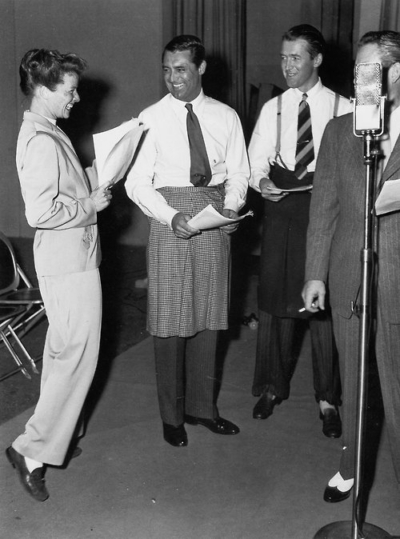 During the entire summer, we have been planning to go to Philadelphia in the Fall so that I may go on with my career. Since my father has gone to the hospital my mother and I have been carrying on the planning and preparation for this trip. We have partially renovated both the inside and outside of the house so that we may rent it in the Fall. Our car must be sold along with a few more of our possessions. When all of these things are taken care of, we will be free to make the trip.
During the entire summer, we have been planning to go to Philadelphia in the Fall so that I may go on with my career. Since my father has gone to the hospital my mother and I have been carrying on the planning and preparation for this trip. We have partially renovated both the inside and outside of the house so that we may rent it in the Fall. Our car must be sold along with a few more of our possessions. When all of these things are taken care of, we will be free to make the trip.
The time seemed endless as Mama and I were waiting to make our journey north. The day finally came, however, and we were on our way. Of all months in the year to pick to head northward we picked January. A normal person would of course come south. We travelled by Greyhound bus (that was the most economical) and planned a stop over in Asheville, North Carolina, to visit my father at the hospital at Oteen . . .
After we settled ourselves [at the Uhleins’ in Willow Grove] I started my search for a place in radio or music. First of all took Arnold Falconnier’s letter to WIP where it was treated as if it were just another piece of paper. Talked to a Mr. Harris, head of the FM activities of that station and discussed possibilities of acquiring a position such as record librarian or some other small job that would place me in the studio where I could observe the procedure of studio work. He had a job in mind which dealt with correspondence and would mean contact with the sponsors, or so he said. I went home elated at the position, only to call the next day to find that he had changed his mind and the job was not open, after of course I had widely published my new job at WIP. Next I went to 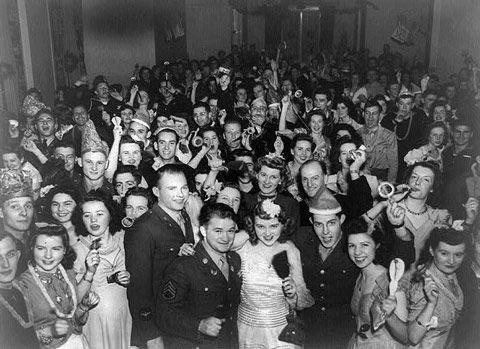 “Uncle Jim Nassau” with whom I had been at WIBG in Glenside. He now has a record and music shop in Glenside. He was very nice and gave me a list of the various persons he knew at the different radio stations. They were announcers, program directors, etc. I could see the possibilities all over the place now, and thought it was just a matter of time. Things were not that easy however and the list was soon exhausted with not a good possibility in view yet. I was most impressed with KYW, the best-equipped and modern studio I had ever seen. Talked with a Mr. Begley, the program director and he arranged an audition with Clarence Fuhrman, their musical director. I had the audition with Mr. Fuhrman singing “Gypsy Love Song” and he was duly impressed however could promise me nothing at the present. I suppose they just had to have a spot in which to place me. Anyhow it was unsuccessful.
“Uncle Jim Nassau” with whom I had been at WIBG in Glenside. He now has a record and music shop in Glenside. He was very nice and gave me a list of the various persons he knew at the different radio stations. They were announcers, program directors, etc. I could see the possibilities all over the place now, and thought it was just a matter of time. Things were not that easy however and the list was soon exhausted with not a good possibility in view yet. I was most impressed with KYW, the best-equipped and modern studio I had ever seen. Talked with a Mr. Begley, the program director and he arranged an audition with Clarence Fuhrman, their musical director. I had the audition with Mr. Fuhrman singing “Gypsy Love Song” and he was duly impressed however could promise me nothing at the present. I suppose they just had to have a spot in which to place me. Anyhow it was unsuccessful.
The next few months were in short nothing but disappointment. They contained all the radio stations and then the theatrical agency of Eddie Suez. Through the Suez agency I went to the Melody Inn and tried out one night. The manager was pleased and told me to come back the next night. I again broadcast to all my good luck only to have it fall through the next day. I was so stunned and hurt that I never bothered to go back to that place again although I suppose I should have, for an explanation. These months also contained an offer from a choirmaster in Wyncote to sing in the protestant choir but that of course did not appeal to me. My singing was a total flop and even to get in the studios with a small job seemed out of the question. My depression couldn’t be any deeper. Several other small possibilities presented themselves only to fall through, so I won’t mention them.
One Sunday I was looking through the paper and found an advertisement of a radio school.
Of course that appealed to me being radio, and I sent in for the information. I received not the information but a representative from the school came to the house and I had even forgotten that I had written for the information. His offer sounded good and the course sounded interesting. Anyway, I had to do something I was getting nowhere fast the way I had been going. So, I signed up for the course, not even fully understanding what it included except that it had that magic word radio in the title.
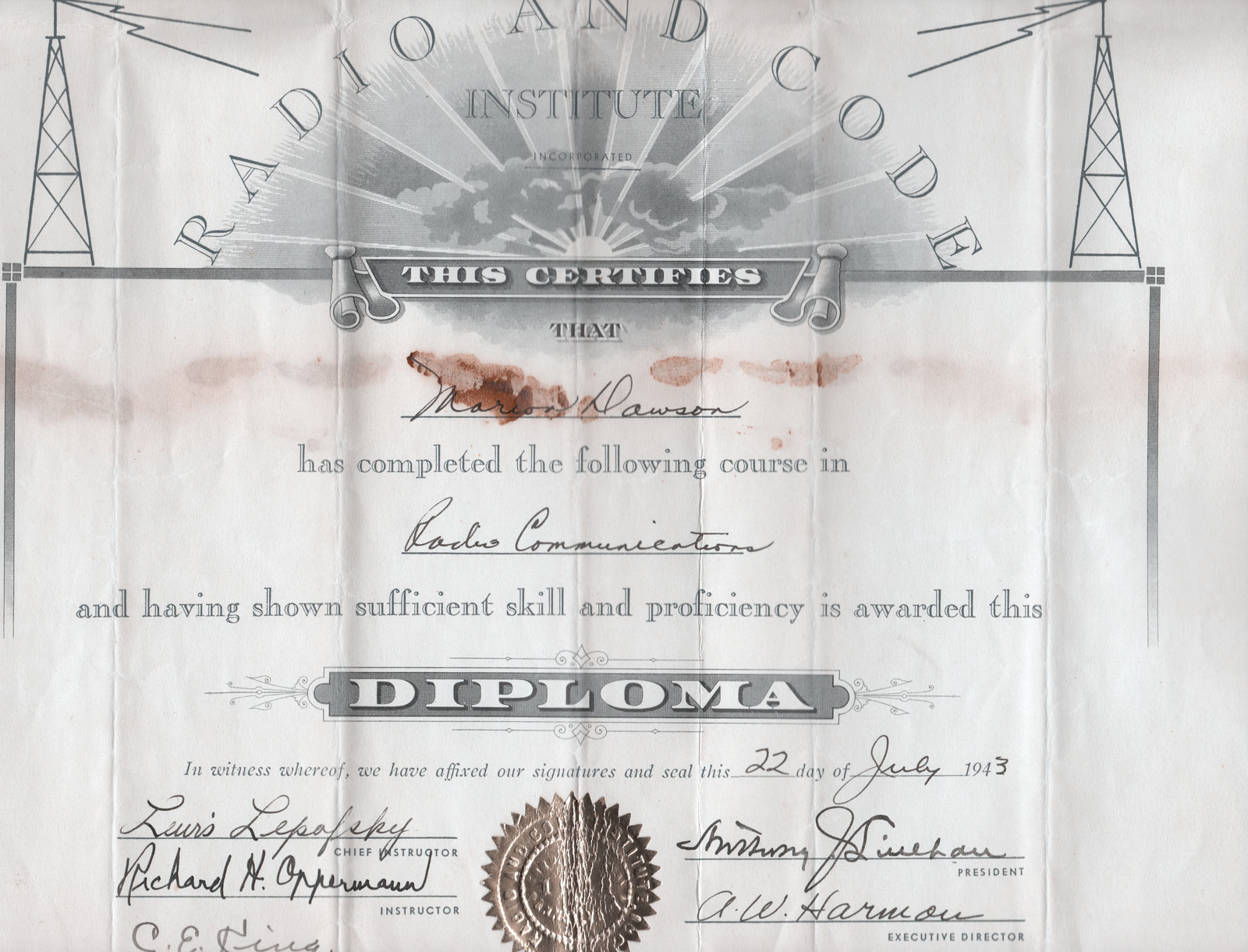 I started school the following week and was surprised to find that it was a radio communications course and consisted of International Morse Code (I had never dreamed of learning this) and a small portion of technical radio. I was going to the school about six weeks when I asked the theory teacher did he know of anywhere where I could work even part time in radio to gain experience. He said that he would inquire at Philco for me. He did this but said that as I was not yet 21 I could not work on the night shift (the factory) as that was the only shift vacancies. I really thought this was the end. A
I started school the following week and was surprised to find that it was a radio communications course and consisted of International Morse Code (I had never dreamed of learning this) and a small portion of technical radio. I was going to the school about six weeks when I asked the theory teacher did he know of anywhere where I could work even part time in radio to gain experience. He said that he would inquire at Philco for me. He did this but said that as I was not yet 21 I could not work on the night shift (the factory) as that was the only shift vacancies. I really thought this was the end. A 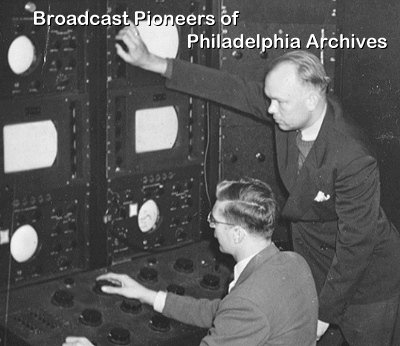 day or so afterward he told me that it might be well to visit a friend of his who was the director of personnel at Philco (a Miss Timm now at Westinghouse). I did so and was surprised to find that she had a position in mind immediately. I told her my ideas and the small amount of technical knowledge with which I was equipped. Much to my surprise I was hired as a “Laboratory Assistant” in the lab of M.L. Thompson. In this lab there were only men engineers and nary a girl for a good city block, let alone a girl lab assistant, of which there were none others. A worm could never feel lower or more humble than I did my first few days and even weeks that I worked in that lab, as my smattering of knowledge was ridiculously small. The engineers with whom I worked were all college grads mostly from MIT in Boston brought to Philco for radar work, I was assigned to their unit and was pleased to find that they were very helpful and sympathetic. I learned a great deal and found the work very interesting, although it had its terrible moments when I realized just how little I knew. These boys were all so much fun and so nice to work with that that burden was lightened. I continued to go to school and would go there directly from work on Mondays, Tuesdays, and Thursdays. This was rather hard as we still lived at Willow Grove (a fourteen mile ride from the center city and my school). So I had to ride fourteen miles after ten PM when school closed at nights, which meant that I climbed in bed at sometime like two AM. Then I would have to be up about six thirty so I could get to work at eight thirty. This didn’t leave much time for sleep. I kept at this however for the remainder of my school and graduated with the bestsellers grades and highest proficiency in my class. I really liked the code now that I had learned it and found I could get along very well with it.
day or so afterward he told me that it might be well to visit a friend of his who was the director of personnel at Philco (a Miss Timm now at Westinghouse). I did so and was surprised to find that she had a position in mind immediately. I told her my ideas and the small amount of technical knowledge with which I was equipped. Much to my surprise I was hired as a “Laboratory Assistant” in the lab of M.L. Thompson. In this lab there were only men engineers and nary a girl for a good city block, let alone a girl lab assistant, of which there were none others. A worm could never feel lower or more humble than I did my first few days and even weeks that I worked in that lab, as my smattering of knowledge was ridiculously small. The engineers with whom I worked were all college grads mostly from MIT in Boston brought to Philco for radar work, I was assigned to their unit and was pleased to find that they were very helpful and sympathetic. I learned a great deal and found the work very interesting, although it had its terrible moments when I realized just how little I knew. These boys were all so much fun and so nice to work with that that burden was lightened. I continued to go to school and would go there directly from work on Mondays, Tuesdays, and Thursdays. This was rather hard as we still lived at Willow Grove (a fourteen mile ride from the center city and my school). So I had to ride fourteen miles after ten PM when school closed at nights, which meant that I climbed in bed at sometime like two AM. Then I would have to be up about six thirty so I could get to work at eight thirty. This didn’t leave much time for sleep. I kept at this however for the remainder of my school and graduated with the bestsellers grades and highest proficiency in my class. I really liked the code now that I had learned it and found I could get along very well with it.
I continued my work at Philco but found that there was very little chance for advancement unless I would go on studying, which I didn’t care to do. I learned that I was not very well suited for engineering work besides I didn’t like it enough to study the length of time that it would require. I couldn’t see my staying at a job that I could not make any advancement, so one night went to see Mr. Harmon the head of the code school. Told him my problem, and he suggested that I try to do some code work as I had gotten along nicely with it. In the meantime we had moved from my godmother’s place to our own apartment at 5901 Lawndale Street in Philadelphia. Toward the end of our stay in Willow Grove we seemed to be in the way at their house and I am sorry to say that we parted bad friends although we tried to pay back their hospitality and help them in every way that we could. It was such a pity as we had been friends so long. You can imagine therefore how glad we were to be in our own apartment and to ourselves.
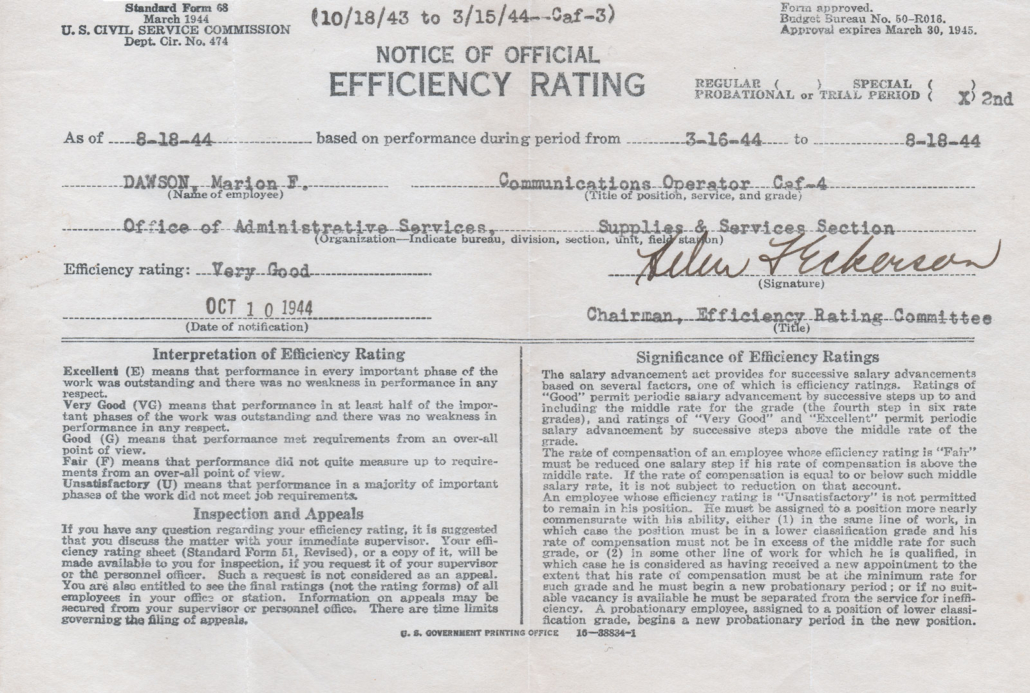 Mr. Harmon suggested that I go to the Immigration and Naturalization Service [at] the Department of Justice as he had heard that they were looking for a radio operator. I did so and was employed as an Assistant Communications Operator. I went to my boss at Philco and asked for a release, which he gave to me although sorry to have me leave, and telling me that I had been listed for a raise in the near future. It could not have compared to the salary of the new position however. Entered on duty at the Department of Justice on the eighteenth of October 1943.
Mr. Harmon suggested that I go to the Immigration and Naturalization Service [at] the Department of Justice as he had heard that they were looking for a radio operator. I did so and was employed as an Assistant Communications Operator. I went to my boss at Philco and asked for a release, which he gave to me although sorry to have me leave, and telling me that I had been listed for a raise in the near future. It could not have compared to the salary of the new position however. Entered on duty at the Department of Justice on the eighteenth of October 1943.
There were many new things to learn, among them typing although I had a small amount of knowledge of typing. There was procedure, which was slightly different from that I had learned in school. There was the procedure of the office and general set-up of the organization. Things came one at a time, and smoothed themselves out finally.
After we got settled in our apartment my father came up from Oteen to stay with us for the summer. He was so tired of the coldness and loneliness of the hospital. (He came up in June and then left for Florida in November right after I received my first pay from my new position.)
The fall and winter of that year passed uneventfully. I was learning all the time at my new job and found my co-workers so nice to work with. The work was interesting and I became very enthralled with it. I am working at the Central office of this service and the key station of the Border Patrol network of 37 stations throughout the country. We contact these stations by CW or code. The office is a small one and for that reason more desirable as there are just a few people to work with. There is a “Radio Lab” upstairs from the station and I go there sometimes to put in a little work at which my Philco experience comes in handy.
The next year, Marian Dawson is 19 when her father dies in their Philadelphia apartment in August of 1944—two months after the liberation of Paris—when World War II starts to wind down.
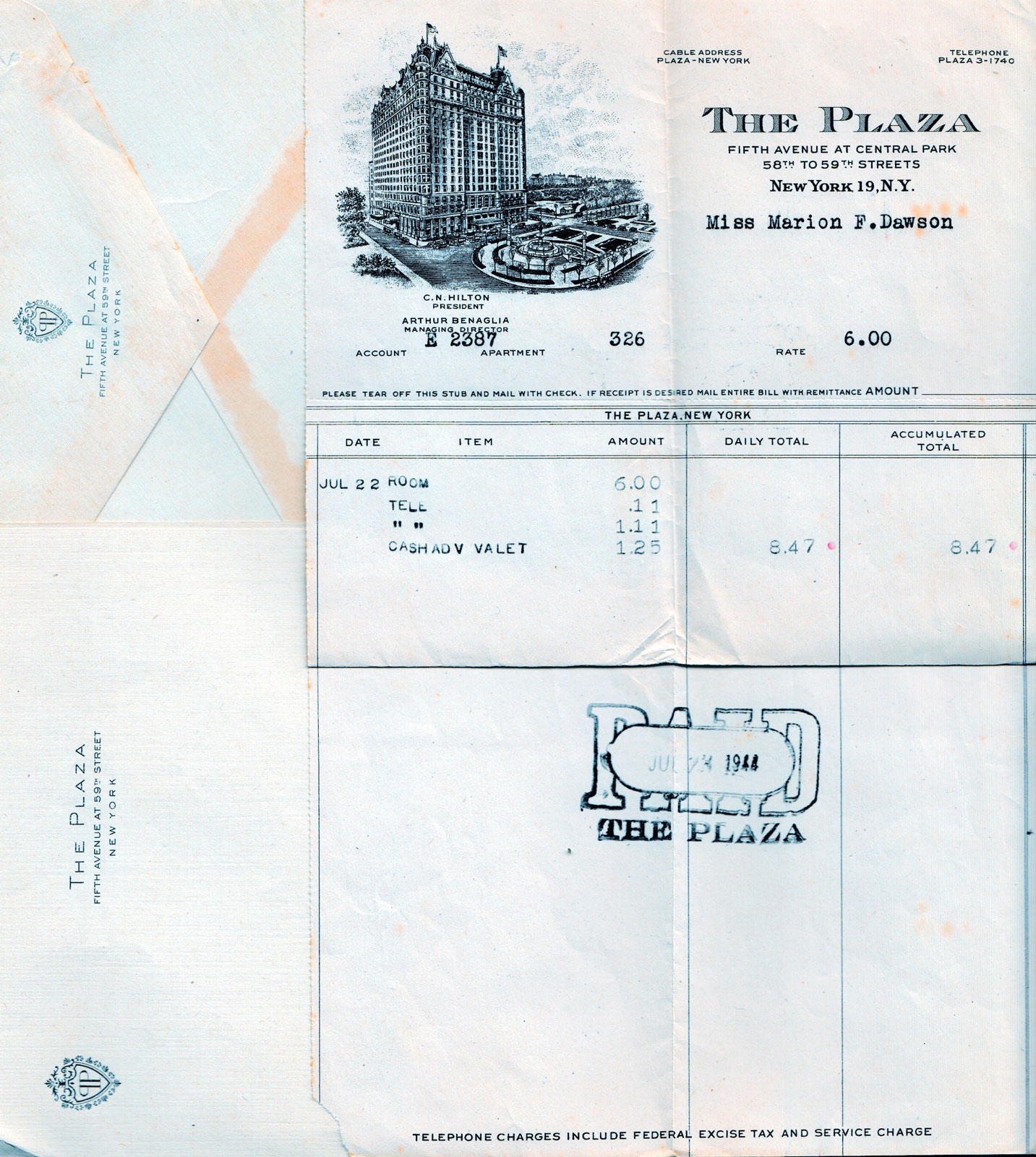 A month before his death she makes a trip—perhaps it was related to her job or it was for an audition—to New York City. In her papers is a paid invoice for one night at the famous Plaza Hotel at 5th Avenue and Central Park South, July 22-23, 1944, for the princely sum of $6.00. She was smart to go when she did—current rates begin at $800/night. She also kept a sheet of stationery and envelope from all those years ago. There’s a story there that is lost—I wish I’d known to ask.
A month before his death she makes a trip—perhaps it was related to her job or it was for an audition—to New York City. In her papers is a paid invoice for one night at the famous Plaza Hotel at 5th Avenue and Central Park South, July 22-23, 1944, for the princely sum of $6.00. She was smart to go when she did—current rates begin at $800/night. She also kept a sheet of stationery and envelope from all those years ago. There’s a story there that is lost—I wish I’d known to ask. 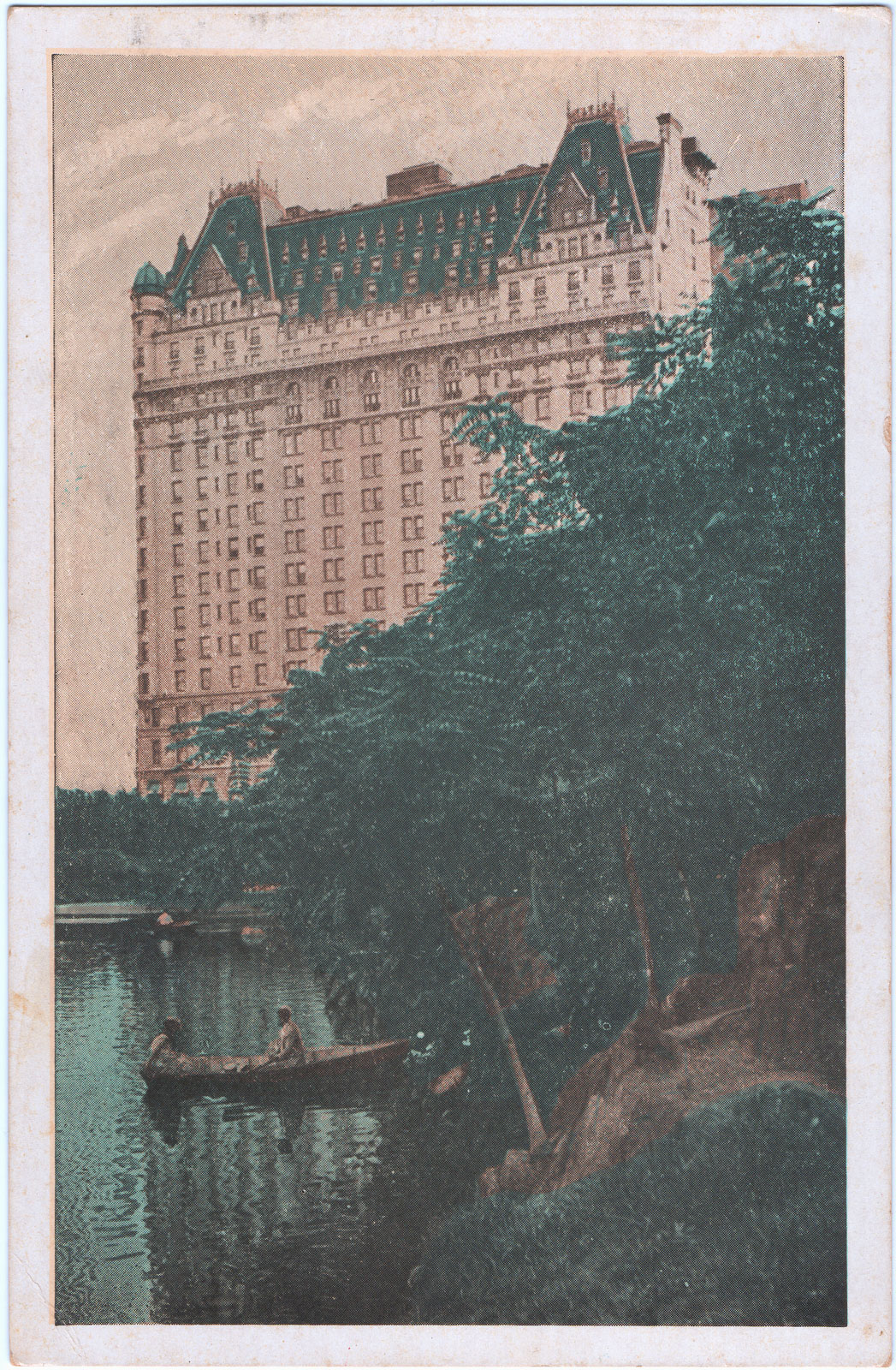
Had she remained in the Department of Justice position in Philadelphia, her financial future would have been comfortable and secure as that job would eventually prove better than any she or our father would ever hold. But she chose not to stay, or something happened to the job. Instead, she and her mother took the train down to Miami, Florida from Philadelphia in 1945.
The following year, our father took the train from Montreal down to visit his friend Henri LaChance in Fort Pierce, Florida. He went back to Montreal in September 1947 but then came back again, this time to Miami, in November 1947.


